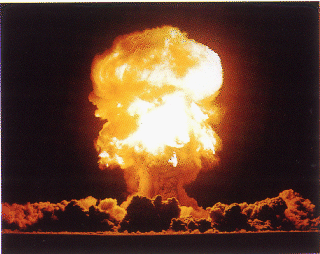
The Friday night meeting of the Mid-American Science Fiction Association had been moved from Ariel's house to the Nagles' because Ariel's kids had the flu. Jerry's wife Susan showed off her new DVD version of Dr. Strangelove, but we were careful not to display too much interest, because Susan tried to screen Dr. Strangelove every time we gathered at the Nagle house.
We read our newest stories out loud. Maruchek almost slipped in the fifth rewrite of the first chapter of Crimson Dales, his own Unendliche Geschichte, but we shouted him down. After the readings we discussed our latest printing project. MASFA had recently reprinted -- in a limited edition, of course -- the science fiction of George Griffith, a writer who outsold H. G. Wells in the late nineteenth century. Now we hoped to publish the essays of SF historian Sam Moskowitz.
"You think we can use the introduction to The Crystal Man without having any of the stories?" asked Jerry, who worried a lot.
"Of course, Jerry," said Robin Meinz, who had novelized a Xena episode and now worked on a real book. "We can't do without it. It covers science fiction of the mid-to-late eighteen-hundreds."
"How about The Issue at Hand?" continued Jerry. "Did anyone ever find a copy of Issue at Hand?"
He waved around Science Fiction By Gaslight like a preacher with a Bible. Susan stepped up and deftly removed it from his grasp before he could smash a hanging pot.
"Honey, James Blish wrote Issue at Hand," she pointed out.
"James Blish? Are you sure?" her husband asked.
I noticed Chilton standing by the French doors. He stared off into the night, his trademark Heineken bottle in one hand. I joined him. All I saw were the back yard and the starry sky.
"It's Under the Moons of Mars we can't find," said Susan. Her husband made worried sounds.
"What's so interesting?" I asked Chilton.
Chilton smiled within his walnut-brown beard.
"The silver locusts have descended in a plague upon Mars," he answered. "The colonists are christening the mountains and valleys with earthly names and covering the red soil with green trees."
"What?"
"I was thinking of futures past," said Chilton. "The first science fiction writers set their stories in the 1980s, the 1990s, 2000 -- unimaginably far away to them. Heck, when I was a kid, I didn't think the twenty-first century would ever get here. Now we're entering an era when a lot of action is taking place in one alternate history or other. It's like that Chinese curse: 'May you live in interesting times.'"
He paused to take a swig of beer.
"The Martian Chronicles are well under way. The Discovery has reached Jupiter with David Bowman, Frank Poole, and HAL 9000. Khan Noonian Singh and his genetic supermen have ruled much of Asia and have already been deposed. Winston Smith is long dead; I'm sure Big Brother finally delivered the bullet in the head he so longed for."
"Oh, I get it," I said. "The chimps and gorillas have risen against their masters on the Planet of the Apes. The moon has already left the solar system in Space: 1999. Sky-Net is sending out Terminators to destroy survivors of the atomic holocaust."
A meteor streaked across the sky.
"Wells' socialists are building their utopian Everytown," continued Chilton. "Heinlein's roads are rolling, and D. D. Harriman has sold the moon. Niven's space program has already sent manned ships to Pluto and Mercury."
"What I want to know is, where are all the robot butlers? The flying cars? The Pan-Am flights to Luna?" I asked.
Chilton grunted. The wide-screen TV flared to life. Susan gave in to the call of Dr. Strangelove.
"Dr. Strangelove 's world is a lifeless nuclear wasteland," said Chilton. "So is On the Beach's and scores of others. Depressing, really."
"Always a market for disasters," I observed.
"I wonder if we were anyone's future," muttered Chilton.
I snorted.
"Why would anyone write about our little timeline?"
"I meant from the viewpoint of a 1930s or '40s like our own," he explained. "From personal computers and the Internet to 51 Pegasi and the strange volcanic history of Io -- such things seem quite remarkable to jaded old me, this very day."
The Nagles' shelves groaned beneath several hundred books. I looked over old favorites: Gnome Press, Arkham House, Ballantine Adult Fantasy. The phone rang.
"It's Ariel," said Susan. I heard a mouse-shrill babble coming out of the receiver from across the room. "She says -- look out the front windows?"
We crowded over to the west side of the house. Chilton and I reached a window in the den.
The things hanging over the city looked like all the pulp magazine and tabloid drawings of flying saucers -- only these were about the size of Long Island. I thought of Independence Day, Alien Nation, V, Childhood's End and a dozen other novels and shows. Orange beams stabbed down from the ships, and gray clouds of steam or smoke billowed up like fog.
"Like I said. Interesting times," muttered Chilton.
